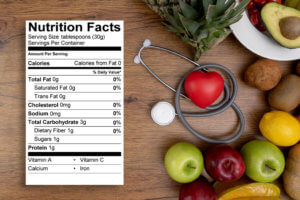National Nutrition Month is an annual nutrition education and information campaign created by the Academy of Nutrition and Dietetics. Founded in 1973, the campaign is celebrated each year during the month of March, and focuses on the importance of making informed food choices and developing sound eating and physical activity habits.
According to the Academy of Nutrition and Dietetics, the key message of National Nutrition Month is as follows:
-
Discover the benefits of a healthy eating style
-
Choose foods and drinks that are good for your health
-
Include a variety of healthful foods from all of the food groups on a regular basis
-
Select healthier options when eating away from home
-
Be mindful of portion sizes
-
Keep it simple
-
Make food safety part of your everyday routine
-
Help to reduce food waste by considering the foods you have on hand before buying more at the store
-
Find activities that you enjoy and be physically active most days of the week
At NJ Diet, we understand nutrition and how to help your get healthier in addition to losing weight! On our plan, every factor regulating metabolism, appetite, fat storage & fat burning is carefully energetically tested for success. Using DNA Testing, over 40 different factors are assessed genetically to make sure you keep it off and stay healthy.
Below, please find our top Nutrition Tips in honor of National Nutrition Month!
Top Nutritional Tips
-
Eat Breakfast -Eating in the morning can boost your metabolism for the rest of the day, helping maintain a healthy weight. Also, people who eat breakfast tend to make healthier eating choices throughout the day and reduce the chance of the mid-afternoon slump.
-
Watch Portion Sizes – Get out the measuring cups and see how close your portions are to the recommended serving size. Use half your plate for fruits and vegetables and the other half for grains and lean protein foods.
-
Be Active – Regular physical activity has many health benefits. Start by doing what exercise you can. You don’t have to hit the gym—take a walk after dinner or play a game of basketball.

-
Inspect Food Labels – Reading the Nutrition Facts panel can help you shop and eat/drink smarter.
-
Healthy Snacking – Healthy snacks can sustain your energy levels between meals, especially when they include a combination of foods. Choose from two or more of the following food groups: grains, fruits, vegetables, dairy, and protein.
-
Follow Food Safety Guidelines – Reduce your chances of getting sick with proper food safety. This includes: regular hand washing, separating raw foods from ready-to-eat foods, cooking foods to the appropriate temperature, and refrigerating food promptly.
-
Drink Water Instead Of Sugary Drinks – 57% of the human body is made of water, so staying hydrated regulates your body fluids, helps you to feel full, and maintains healthy skin, kidneys, and bowel function. Sugary drinks tend to be high in calories, are linked to struggles with obesity, and cause tooth decay, dehydration and can even affect your sleep patterns.
-
Healthy Cooking – Preparing foods at home can be healthy, rewarding and cost-effective.
-
Reduce Sugars – Foods and drinks with added sugars can contribute empty calories and little or no nutrition. Review ingredients on the food label to help identify sources of added sugar.
-
Try New Foods and Flavors – Add more nutrition and eating pleasure by expanding your range of food choices.
-
Reduce Food Waste – Check out what foods you have on hand before stocking up when food shopping. Plan meals based on leftovers and only buy what you will use, which will help save nutrients and money.
-
Take Your Time At Mealtime – Instead of eating on the run, try sitting down and focusing on the food you’re about to eat. Dedicating time to enjoy the taste and textures of foods can have a positive effect on your food intake.

Eating Nutritionally Sound To Maintain A Healthy Weight
Reaching and maintaining a healthier weight contributes to your overall health and well being. Losing even a few pounds or preventing further weight gain has health benefits. Here are some nutritional tips to get you started!
-
Plan For Lifelong Health: Focus on the big picture— achieving overall good health—not just short-term weight loss.
-
Set Healthy, Realistic Goals: You are more likely to succeed in reaching realistic goals when you make changes slowly. Start with one or two specific, small changes at a time.
-
Balance Your Plate: Half your plate should be filled with fruits and vegetables, about one fourth with lean meat, poultry or fish, and one fourth with grains. To round out your meal, add fat-free or low-fat milk, yogurt or cheese.
-
Focus On What You Eat: Pick one place to sit down and eat at home. Eating while doing other things may lead to eating more than you think. Also, switching from a large plate to a smaller one may help reduce portions.
-
Know When To Say “When”: Quit before you feel full or stuffed. It takes about 20 minutes for your brain to get the message that your body is getting food. When your brain gets this message, you stop feeling hungry.
-
Portion Sizes Manage Caloric Intake: Simply put, this is the key to an effective weight management plan.
-
Smart Snacking: Include snacks as part of your daily calorie allowance and limit portions to one serving. Plan for nutritious snacks by keeping healthy snacks in your desk or car.
-
Be Active: Regular physical activity is important for your overall health and fitness, and control body weight, promotes a feeling of well-being and reduces the risk of chronic diseases. Aim for 2 hours and 30 minutes or more each week of moderate-intensity aerobic activity and muscle-strengthening activities at least two days per week are also recommended.
* * *

If you are ready for a lifestyle change, NJ Diet is here to help! We help you not only keep the fat off, but to stay healthy. Our program is not only aimed at promoting healthy weight loss, but aims to improve your total wellness — where the side effect is weight loss, but the end result is better overall health and well being! When you come in for your initial evaluation and consultation at NJ Diet, we will explain how many metabolic factors are assessed to genetically make sure you not only lose the weight, but ensures you keep it off and stay healthy for a lifetime.
Attending the Initial Evaluation and Consultation is normally $99, but by registering on our website it will only cost $27!
We welcome the opportunity for you to have a consultation with us, so register online now!




